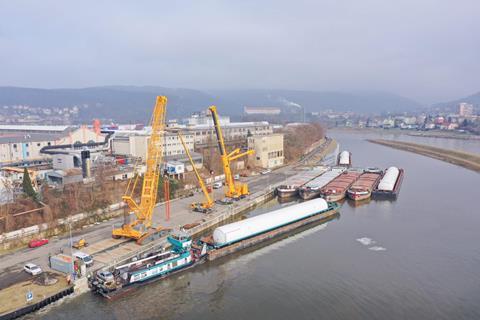deugro moved four LNG tanks with a unit weight of 225.4 tonnes from the manufacturer’s yard in Decin, Czech Republic, via the port of Hamburg, Germany, to a construction site in the Caribbean Sea.

The LNG tanks measured 48.9 m x 5.8 m x 6 m. The project was executed by deugro’s offices in the USA, the Czech Republic and Germany. Transport was originally scheduled to start in December 2020, but challenging weather conditions led to an adjustment of the execution plan for safe marine transit. The water level of the River Elbe was too low for any barge transport.
deugro had to arrange a secure storage area at the quay near the port of Rozbelesy, Czech Republic, to temporarily store three LNG tanks until the water level of the Elbe was sufficient.
“The overall timing for the crane and barge arrangements was crucial to ensuring a smooth and final barge loading operation. Managing the timing of the barge arrivals in Hamburg with the arrival of the US-flagged, multipurpose heavy lift vessel in Hamburg in order to avoid barge and or vessel detention was equally challenging,” said Jens Klie, vice president, deugro USA.
The initial leg of the transport included 3 km road haul from the manufacturer’s premises through Decin’s city centre to the port of Rozbelesy, requiring local movement permits to be obtained and implemented.
The transport route had to be completely closed off by the traffic police, streetlamps as well as further road furniture dismantled, and overhead wires adjusted to accommodate the size of the loaded trailer convoy. The tanks were moved at a walking speed of a maximum of 5 km/h by two prime movers and a specialist 22-axle hydraulic platform heavy-duty trailer configuration, separated in two 11-axle units, each equipped with a turntable.
At the port, the barge loading operations were executed directly from the trailers onto four barges, one for each tank. After altogether two days of loading and cargo securing, the barges were ready for their voyage to the designated terminal in Hamburg, with the four river barges connected and then pushed by a tugboat in twos. The barges left Rozbelesy and after eight days and over 536 km of river transit, the LNG tanks arrived safely at the port of Hamburg,
Under supervision from dteq Transport Engineering Solutions, the units were transhipped directly to the heavy lift vessel. “Operation-specific toolbox talks with all parties involved is mandatory, in order to clearly define the different steps of the operation, the responsibilities and the line of communication to reduce the potential risks for such operations to a minimum,” said Felix Kok, regional head of transport engineering EMEA, dteq Transport Engineering Solutions.
After two days of loading, the cargo securing was safely and successfully completed, and the vessel was ready to set sail for the 17-day ocean voyage to its destination in the Caribbean.
“The challenging part was the direct transhipment from the barge onto the vessel, as handling cargo from a floating object onto a floating object is always a critical operation. Strong weather conditions like wind as well as the current of the river, which usually keeps any floating object in slight motion, can result in swinging cargo when initially lifted,” said Eva Klepping, transport engineer, dteq Transport Engineering Solutions.
Klie added: “Despite adverse weather conditions, flexibility, detailed timing and the close cooperation and communication between deugro, the client, dteq and all subcontractors led this project to a successful conclusion.”
















